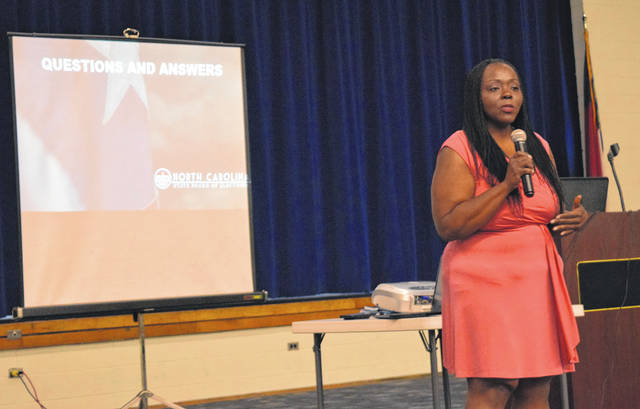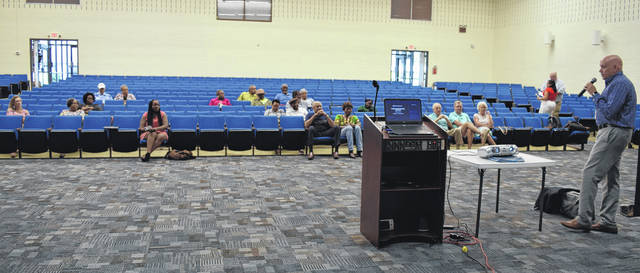DUBLIN — A voter ID educational seminar was held Thursday at Bladen Community College by the state Board of Elections to answer questions about the upcoming changes.
In the 2020 election cycle, voters have to show a valid photo identification.
Veronica DeGraffenreid, director of election operations for the state board staff, and Jason Schrader, a training specialist, were in the college auditorium for a morning and evening session. They also shared information on provisional ballots, voter registration and residency.
Attendance was light.
“The biggest takeaway from today’s session is that you don’t need to be concerned about needing identification for voting in 2019,” he said. “But starting in 2020 all voters will be asked for identification if voting in the primary or general election. Voters will also be asked to provide a copy of their photo ID when voting absentee by mail.”
Photo ID includes a variety of types of documentation, with a driver’s license, a passport, military and veterans IDs, federally recognized tribal cards, and others being on the list. The driver’s license or issued identification card can’t be expired more than one year, same as with passports.
Military and veteran IDs have no expiration limits. Also some student IDs are acceptable as well.
The full list is available on the state board’s website at ncsbe.gov.
Those that don’t have one of these are also eligible to go to the county Board of Elections office and provide them with information, including date of birth, name and the last four digits of their Social Security number. They can then have a voter identification card made. That card is good for 10 years, and even if it is not renewed it does not render a voter inactive.
“If a voter is over 65, any expired form of any acceptable ID is allowed as long as it was not expired on the voter’s 65th birthday,” Schrader said.
The voter ID process at one-stop voting and on Election Day is a four-part process. The voter goes to the location, a precinct official will ask for name and residence address, the voter states the information, presents an acceptable ID, and after examination the voter, if duly registered, is given a ballot.
So what happens if the voter comes to the polls without an ID?
A provisional vote is still possible, but the voter would need to bring an acceptable form of ID to the county Board of Elections before canvass, or sign an affidavit that a reasonable impediment prevented the voter from showing photo ID.
“Myself and my team, we are the ones that work directly with your local Board of Elections offices,” DeGraffenreid said.
She particularly mentioned that there is some pending legislation that may change parts of the processes.
“The state Board of Elections felt that it was very important that you know that we support you,” she said. “We want to make sure that you guys are well supported and that you are well informed.”
So much has changed in the behind-the-scenes technology, with more resources being used to audit the elections.
“Addressing and jurisdiction is the core of elections administration,” she said.
A few attendees mentioned areas where there are small strips of people that are on the same road, but in different districts, and that they wanted to see about having those addressed.
DeGraffenreid said that they were aware of those types of issues and were actively working on them.
Others felt that there were concerns about those deceased being left on the roles of active voters, and that was something that needed to be examined. Families of those deceased need to notify the Board of Elections of the situation and present them with a death certificate.
“We cannot take someone off the list, even if we know they are deceased, without some solid paperwork,” said Valeria McKoy, the interim director for the Bladen County Board of Elections.
McKoy said that she can know someone is her neighbor and is deceased but without the proper paperwork nothing can be done on her end.

Veronica DeGraffenreid is the director of election operations for the state Board of Elections.

Jason Schrader is a training specialist with the state Board of Elections.

